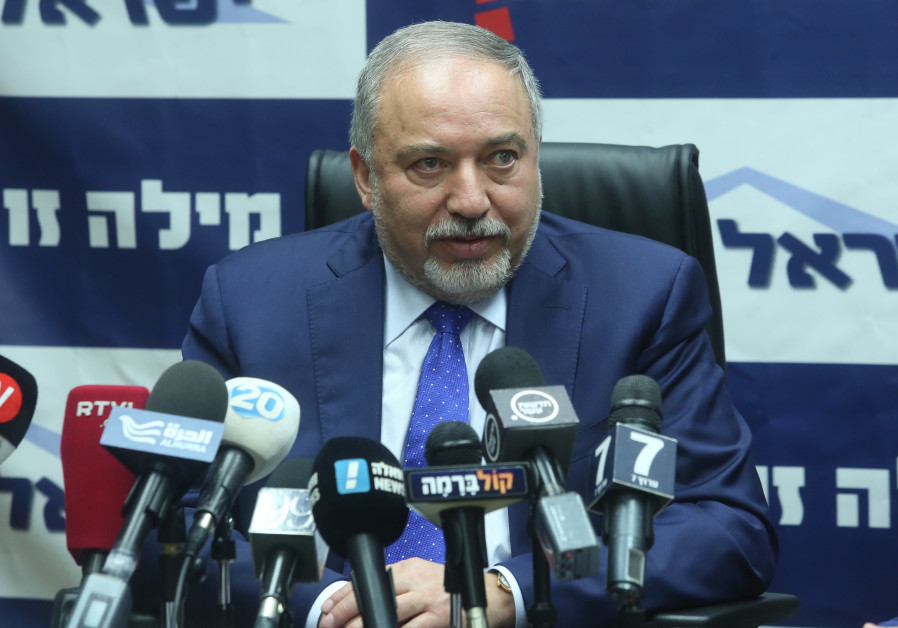Liberman: US sanctions will reduce Iran’s terror financing

Defense Minister Avigdor Liberman . (photo credit: MARC ISRAEL SELLEM/THE JERUSALEM POST)
The US sanctions enacted on November 4 will not stop Iran from getting a nuclear bomb, but they will pressure the regime and significantly reduce its ability to finance regional terror, Defense Minister Avigdor Liberman said on Sunday night.
Speaking at the Jerusalem Institute for Strategic Studies, Liberman explained that “the first round of US sanctions had a big impact on Iran” causing “inflation [and] reducing foreign investments.”
“So the second round of sanctions will obviously have an even bigger impact. The fact that Iran will not be able to fund terror” is crucial and will negatively impact “Hezbollah, Hamas, proxies in Yemen and proxies in Iraq,” he said.
Still, he believes that Iran has made a political decision to eventually obtain a nuclear weapon and that sanctions alone could not force it to change its mind, although he hoped they would pressure the regime internally.
The defense minister also holds that the current regime of the ayatollahs will fall like many former communist regimes connected with the USSR, but implied this could take time. In that light, he said “we need to deter Iran” from trying to get a nuclear bomb “and be ready for all scenarios.”
Liberman reiterated his position that Israel must “strike a great blow” against Hamas to achieve quiet in Gaza and insisted on evacuating the Bedouin village of Khan al-Ahmar, while leaving room to negotiate the evacuation.
Earlier at the conference, former National Security Council Chief Yaakov Amidror and a JISS fellow proclaimed that the IDF would overcome the challenge of the S-300 antiaircraft missile system that Russia recently provided to Syria.
Amidror was certain when he said Russian President Vladimir Putin had made an uncharacteristic blunder by presenting the S-300 as Russia’s unbeatable answer to the IDF’s air power. He noted this would lead to embarrassment for Russia when the IDF succeeds at striking Syria despite the presence of the S-300.
Amidror continued by saying that in several decades, “there is not a single Russian-made weapon that we have not figured out a technical-tactical solution for confronting. There is no reason to think Israel will not find a solution to the S-300.” Regarding overcoming the S-300, he said “there are different S-300 models. It is a tactical [item] which has never been in the Middle East. We are not familiar with it. We need a deep intelligence process to know exactly which S-300 model was provided” to the Syrians.
He also asked, ”Who is operating the S-300? The Russians? The Syrians? The Iranians?…We will act differently depending on…who pulls the trigger,” implying that the IDF could act more aggressively if those manning the S-300 were not Russians.
Another thing that assured Amidror was that “Israeli intelligence has been doing incredible work with both long-range surveillance and [covert] forces going in and out [of Syria,]…to make sure the IDF hits targets exactly…and without hitting any of the Russian” advisers stationed near Syrian troops.
At the same conference, Strategic Affairs Minister Gilad Erdan advocated Israel widen its targets in Syria to include Iranian communication units and not just weapons transfers to Hezbollah and Syria.
Erdan called on the US to publicly announce it will back any Israeli operations against Iran in Syria.
Finally, he expressed hope that from recent talks with England’s new interior minister, once the UK leaves the EU, it will become the first Western European country to declare both Hezbollah’s political and military wings to be terroristic in nature (currently only the EU declares the military wing to be so.)
Speaking at the conference, former national security council official and JISS fellow Micky Ahronson asserted that the Russia-Iran team could be broken with the right set of incentives, like appeasing Russia in other geopolitical areas it remains concerned about, such as Ukraine.
JISS Vice President, former national security council officer and IDF Col. (ret.) Dr. Eran Lerman said that it appears that the Trump administration would keep some troops in Syria, which would help Israel hold back Iran.
However, the US defense establishment would be unlikely to support an attack on Iran if it tried to attain a nuclear weapon in light of the difficult situations in Iraq and Afghanistan. This would leave Israel to attack in a worst case scenario, Lerman said.
Join Jerusalem Post Premium Plus now for just $5 and upgrade your experience with an ads-free website and exclusive content. Click here>>






Comments are closed.